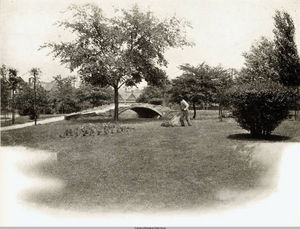Linn Park: Difference between revisions
No edit summary |
No edit summary |
||
| Line 1: | Line 1: | ||
:''This article is about the downtown park. There is also a [[Lynn Park]] in [[East Lake]].'' | :''This article is about the current downtown park. For the first park in Birmingham, see [[Linn's Park]]. There is also a [[Lynn Park]] in [[East Lake]].'' | ||
[[Image:Linnpark.jpg|right|thumb|300px|Capitol Park in 1910.]] | [[Image:Linnpark.jpg|right|thumb|300px|Capitol Park in 1910.]] | ||
'''Charles Linn Park''' (formerly '''Woodrow Wilson Park''', '''Central Park''', and '''Capitol Park''') was one of three parks included in the original plans for [[Birmingham]]. It was built in what would later become downtown during the city's early boom days. It was given the name "Capitol Park" initially because Birmingham's early boosters planned to lobby for moving the state capital from Montgomery to the new city. | '''Charles Linn Park''' (formerly '''Woodrow Wilson Park''', '''Central Park''', and '''Capitol Park''') was one of three parks included in the original plans for [[Birmingham]]. It was built in what would later become downtown during the city's early boom days. It was given the name "Capitol Park" initially because Birmingham's early boosters planned to lobby for moving the state capital from Montgomery to the new city. | ||
The park was first renamed, for Woodrow Wilson, after World War I. It was later renamed Linn Park to honor [[Charles Linn]]. | The park was first renamed, for Woodrow Wilson, after World War I. It was later renamed Linn Park to honor [[Charles Linn]], who created the [[Linn's Park|first landscaped park]] in the city near the [[Relay House]]. | ||
Linn Park is surrounded by the original Birmingham Public Library bulding, now the [[Linn-Henley Research Library]], the [[Jefferson County Courthouse]], [[Birmingham City Hall]], [[Park Place Tower]] and other office buildings. It is bounded by [[20th Street North]] to the west, [[Park Place]] to the south, [[8th Avenue North]] to the north, and both [[Linn-Henley Research Library]] and the [[Jefferson County Courthouse]] to the east. | Linn Park is surrounded by the original Birmingham Public Library bulding, now the [[Linn-Henley Research Library]], the [[Jefferson County Courthouse]], [[Birmingham City Hall]], [[Park Place Tower]] and other office buildings. It is bounded by [[20th Street North]] to the west, [[Park Place]] to the south, [[8th Avenue North]] to the north, and both [[Linn-Henley Research Library]] and the [[Jefferson County Courthouse]] to the east. | ||
Revision as of 19:46, 5 February 2007
- This article is about the current downtown park. For the first park in Birmingham, see Linn's Park. There is also a Lynn Park in East Lake.
Charles Linn Park (formerly Woodrow Wilson Park, Central Park, and Capitol Park) was one of three parks included in the original plans for Birmingham. It was built in what would later become downtown during the city's early boom days. It was given the name "Capitol Park" initially because Birmingham's early boosters planned to lobby for moving the state capital from Montgomery to the new city.
The park was first renamed, for Woodrow Wilson, after World War I. It was later renamed Linn Park to honor Charles Linn, who created the first landscaped park in the city near the Relay House.
Linn Park is surrounded by the original Birmingham Public Library bulding, now the Linn-Henley Research Library, the Jefferson County Courthouse, Birmingham City Hall, Park Place Tower and other office buildings. It is bounded by 20th Street North to the west, Park Place to the south, 8th Avenue North to the north, and both Linn-Henley Research Library and the Jefferson County Courthouse to the east.
The park contains several statues and other monuments, including a marker designating the official center of Birmingham.
As Birmingham's primary civic space, Linn Park hosts numerous events such as the Birmingham Christmas tree lighting ceremony, City Stages, the Magic City Art Connection, Magic City Blues Fest and other gatherings.
See also
References
- White, Marjorie Longenecker, ed. (1980) Downtown Birmingham: Architectural and Historical Walking Tour Guide, second edition. Birmingham: Birmingham Historical Society.
